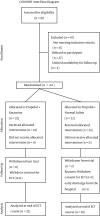Antidepressant Effect of Combined Ketamine and Electroconvulsive Therapy on Patients With Major Depressive Disorder: A Randomized Trial
- PMID: 26576166
- PMCID: PMC4644613
- DOI: 10.17795/ijpbs-1578
Antidepressant Effect of Combined Ketamine and Electroconvulsive Therapy on Patients With Major Depressive Disorder: A Randomized Trial
Abstract
Background: One of the shortcomings of the available treatments for major depressive disorder (MDD) is the time delay between starting the treatment and achieving an antidepressant response.
Objectives: We aimed to determine the effect of Ketamine as a synergistic antidepressant and anesthetic agent on MDD in electroconvulsive therapy (ECT).
Patients and methods: Twenty-two patients with MDD received Ketamine and Propofol as anesthetic agents compared with 20 patients as the control group who received Propofol in a double-blind randomized clinical trial. The Hamilton rating scale for depression was used to determine the changes in symptoms severity during ECT and a 2-week follow-up.
Results: Both groups showed a reduction in depression severity, but there was no significant difference between the groups in the recovery process (P = 0.92). However, the cognitive performance recovery time in the Ketamine group was lower than that in the control group (P = 0.042).
Conclusions: This study could not show the effect of Ketamine on depression recovery in a 2-week follow-up period. Nevertheless, Ketamine may provide a better cognitive performance in patients under ECT.
Keywords: Antidepressants; Electroconvulsive Therapy; Ketamine.
Figures



References
-
- Bosker FJ, Westerink BH, Cremers TI, Gerrits M, van der Hart MG, Kuipers SD, et al. Future antidepressants: what is in the pipeline and what is missing? CNS Drugs. 2004;18(11):705–32. - PubMed
-
- Pagnin D, de Queiroz V, Pini S, Cassano GB. Efficacy of ECT in depression: a meta-analytic review. J ECT. 2004;20(1):13–20. - PubMed
-
- Souery D, Papakostas GI, Trivedi MH. Treatment-resistant depression. J Clin Psychiatry. 2006;67 Suppl 6:16–22. - PubMed
-
- Berman RM, Cappiello A, Anand A, Oren DA, Heninger GR, Charney DS, et al. Antidepressant effects of ketamine in depressed patients. Biol Psychiatry. 2000;47(4):351–4. - PubMed
LinkOut - more resources
Full Text Sources
Other Literature Sources
